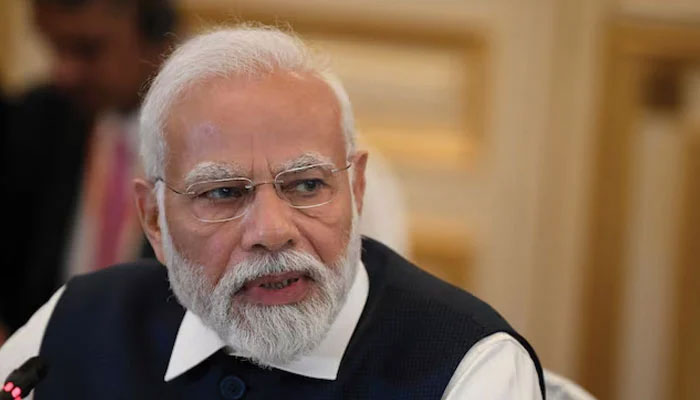No question of restoring Jammu and Kashmir’s special status: Modi
Modi says he had “buried the wall of Article 370 in the graveyard”
KARACHI: Indian Prime Minister Narendra Modi has said no power in the world can restore Jammu and Kashmir’s partial autonomy, which was cancelled in August 2019 by his Hindu nationalist government.
Speaking at a public meeting a day after the newly-elected Jammu and Kashmir alliance’s decision to pass a resolution, despite opposition from BJP members, to call for the restoration of partial autonomy to the region, he said he had “buried the wall of Article 370 in the graveyard”.
Addressing lawmakers from the Indian-occupied territory, Modi said those dreaming of getting Article 370 status restored should be mindful of the fact that the decision to revoke the region’s special status was not an ordinary decision, and no power in the world can undo it.
His remarks came as a heated session erupted in the Indian-occupied Jammu and Kashmir Assembly on Thursday when the Bharatiya Janata Party (BJP) legislators protested against the resolution calling for the restoration of partial autonomy to the region.
BJP lawmakers clashed with other legislators before being escorted out by assembly marshals for disrupting proceedings. This unrest followed the newly-elected Jammu and Kashmir alliance’s decision of Wednesday to pass the resolution, despite opposition from BJP members.
While the assembly has voiced its stance, the authority to reinstate Kashmir’s special status rests solely with India’s federal government, which is expected to reject the demand as restoring autonomy has long been opposed by the BJP. New Delhi had cancelled IoK’s special status in 2019, a sudden decision accompanied by mass arrests and a months-long communications blackout. It had been ruled by a governor appointed by New Delhi since. But last month the territory also elected its local legislative assembly, with voters choosing a government in opposition to Modi’s Hindu-nationalist BJP.
-
 Kanye West's Last Measure To Save Bianca Censori Marriage As He Tries To Salvage Image
Kanye West's Last Measure To Save Bianca Censori Marriage As He Tries To Salvage Image -
 Kim Kardashian Finally Takes 'clear Stand' On Meghan Markle, Prince Harry
Kim Kardashian Finally Takes 'clear Stand' On Meghan Markle, Prince Harry -
 Christina Applegate Makes Rare Confession About What Inspires Her To Keep Going In Life
Christina Applegate Makes Rare Confession About What Inspires Her To Keep Going In Life -
 Patrick J. Adams Shares The Moment That Changed His Life
Patrick J. Adams Shares The Moment That Changed His Life -
 Selena Gomez Getting Divorce From Benny Blanco Over His Unhygienic Antics?
Selena Gomez Getting Divorce From Benny Blanco Over His Unhygienic Antics? -
 Meet Arvid Lindblad: Here’s Everything To Know About Youngest F1 Driver And New Face Of British Racing
Meet Arvid Lindblad: Here’s Everything To Know About Youngest F1 Driver And New Face Of British Racing -
 At Least 30 Dead After Heavy Rains Hit Southeastern Brazil, 39 Missing
At Least 30 Dead After Heavy Rains Hit Southeastern Brazil, 39 Missing -
 Courtney Love Recalls How ‘comparison’ Left Marianne Faithfull ‘broken’
Courtney Love Recalls How ‘comparison’ Left Marianne Faithfull ‘broken’ -
 Pedro Pascal Confirms Dating Rumors With Luke Evans' Former Boyfriend Rafael Olarra?
Pedro Pascal Confirms Dating Rumors With Luke Evans' Former Boyfriend Rafael Olarra? -
 Ghost's Tobias Forge Makes Big Announcement After Concluding 'Skeletour World' Tour
Ghost's Tobias Forge Makes Big Announcement After Concluding 'Skeletour World' Tour -
 Katherine Short Became Vocal ‘mental Illness’ Advocate Years Before Death
Katherine Short Became Vocal ‘mental Illness’ Advocate Years Before Death -
 SK Hynix Unveils $15 Billion Semiconductor Facility Investment Plan In South Korea
SK Hynix Unveils $15 Billion Semiconductor Facility Investment Plan In South Korea -
 Buckingham Palace Shares Major Update After Meghan Markle, Harry Arrived In Jordan
Buckingham Palace Shares Major Update After Meghan Markle, Harry Arrived In Jordan -
 Demi Lovato Claims Fans Make Mental Health Struggle Easier
Demi Lovato Claims Fans Make Mental Health Struggle Easier -
 King Hospitalized In Spain, Royal Family Confirms
King Hospitalized In Spain, Royal Family Confirms -
 Japan Launches AI Robot Monk To Offer Spiritual Guidance
Japan Launches AI Robot Monk To Offer Spiritual Guidance




